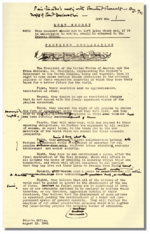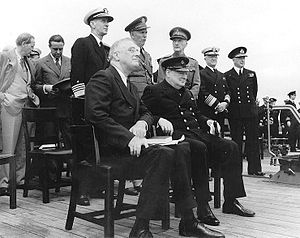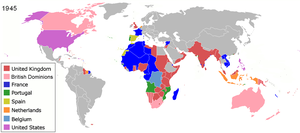| Revision as of 01:04, 6 June 2008 editBlueLint (talk | contribs)470 editsm Reverted edits by 76.180.157.165 to last version by 76.171.102.96← Previous edit | Revision as of 03:01, 8 June 2008 edit undoStor stark7 (talk | contribs)Pending changes reviewers4,163 edits colonialismNext edit → | ||
| Line 40: | Line 40: | ||
| The acknowledgment that all peoples had a right to self-determination gave hope to independence leaders in ] (e.g., ]<ref>Bayly, C., and Harper, T., 2004. Forgotten Armies: The Fall of British Asia, 1941-1945. Belknap Press.</ref>) and elsewhere (e.g., ] in ]<ref>Karnow, S., 1983. Vietnam: A History. Penguin.</ref>) that they might expect progress on their demands for national autonomy. Whether this was the intent of either Churchill or Roosevelt is uncertain. | The acknowledgment that all peoples had a right to self-determination gave hope to independence leaders in ] (e.g., ]<ref>Bayly, C., and Harper, T., 2004. Forgotten Armies: The Fall of British Asia, 1941-1945. Belknap Press.</ref>) and elsewhere (e.g., ] in ]<ref>Karnow, S., 1983. Vietnam: A History. Penguin.</ref>) that they might expect progress on their demands for national autonomy. Whether this was the intent of either Churchill or Roosevelt is uncertain. | ||
| ==Violation of the principles== | |||
| ] | |||
| ]]] | |||
| Already early during the war Churchill had argued for a watered out interpretation of the charter, for example for the purpose of denying the ] the right to self-determination and territorial integrity. | |||
| In a letter dated August 11 Churchill stated that he considered the Charter as no more than an "interim and partial statement of war aims designed to reassure all countries of our righteous purpose and not the complete structure which we should build after the victory." | |||
| Churchill also stated that the Charter had no legal validity, and in any way did not apply to enemy nations, thus making the charter an oxymoron. | |||
| Churchil also stated that the Charter specifically did not apply to ] | |||
| An office of the ] wrote to warn ] that if the Charter was implemented with regards to national self-determination, it would make the planned Polish annexation of ], ] and German ] impossible. | |||
| In a speech in September 1941 Churchill argued against Roosevelt's position that the Charter was universally applicable. Churchill stated that it was only meant to apply to states under German occupation, and certainly not to the peoples who formed part of Brittains colonial Empire. | |||
| To exemplify the Allied dismissal of the Atlantic charter, such as British and American complicity in the planned ] and ] from their homelands; a clear violation of two of the charter points, ] uses a speech by British Labour MP John Rhys-Davies in the ] on March 1, 1945:<ref>] published in Vardy/Tooley ''Ethnic Cleansing in 20th Century Europe'' Columbia University Press, (2003) ISBN 0-88033-995-0 pp. 239-254</ref> {{cquote| We started this war with great motives and high ideals. We published the Atlantic Charter and then spat on it, stomped on it and burnt it, as it were, at the stake, and now nothing is left of it.}} | |||
| ==Notes== | ==Notes== | ||
| <div class="references-small"> | <div class="references-small"> | ||
Revision as of 03:01, 8 June 2008

The Atlantic Charter was negotiated at the Atlantic Conference (codenamed Riviera) by British Prime Minister Winston Churchill and U.S. President Franklin D. Roosevelt, aboard warships in a secure anchorage in Ship Harbour, Newfoundland, and was issued as a joint declaration on August 14, 1941.
Course of events

As a cover story, a flag day was enacted at Downing Street, filmed, and then broadcast while Churchill had already set off for the conference using, for the first part of the journey, the Great Central Railway. Disembarking at Thurso, he boarded HMS Prince of Wales at Scapa Flow. Though the ship had to make multiple course changes to avoid U-boats and lost her escorts to bad weather, Churchill found the voyage restful, reading novels, watching films and losing at backgammon to Harry Hopkins.
On the morning of Saturday, August 28, the Prince of Wales sailed into Placentia Bay down a line of US ships to the USS Augusta where Roosevelt—who, like Churchill, had left Washington under a cover story (he was supposedly in New England on a ten-day fishing trip)—his son and his chiefs of staff were waiting. On first meeting, Churchill and Roosevelt were silent for a moment until Churchill said "At long last, Mr. President.", to which Roosevelt replied "Glad to have you aboard, Mr. Churchill". Churchill then delivered to the president a letter from King George VI and made an official statement which, despite two attempts, a sound-film crew present failed to record.
Whilst the chiefs of staff and head of state and head of government met, Churchill's bodyguard Walter Thompson was shown round the ship and lunched with the president's bodyguard Mike Reilly. The following day, Sunday August 10, a church parade was held on Prince of Wales. From a lectern draped in British and U.S. flags, and with a congregation and naval clergy drawn from both nations, hymns selected by Churchill were sung with the sound of the patrolling US aircraft overhead in the background. Walter Thompson was personally presented to the president by Churchill on the last day of the conference.
As the Prince of Wales departed, sailors from both navies lined their ships, the national anthem of the United States was played and Churchill stood at the salute until the whole line of U.S. warships had been passed. The ship then set off for Iceland, on a convoy route. Passing twice through the three lines of a convoy so that it could be reviewed by Churchill, stopping at Iceland for the troops there to be reviewed, and making two more course changes against suspected U-boats, the ship then arrived back at Scapa Flow. Churchill took a train back to London, where he was met by his wife and some of his cabinet members.
The Atlantic Charter was an agreement made by Roosevelt and Churchill, which set goals for the postwar world. It agreed to seek no territorial gain from the war. It was made to keep "the right of all peoples to choose te form of government under which they will live", and "a permanent system of general security". They organized the United Nations.
Content
The Atlantic Charter established a vision for a post-World War II world, despite the fact that the United States had yet to enter the war. The participants hoped that the Soviet Union would adhere as well, after having been attacked by Nazi Germany in June 1941 in defiance of the Molotov-Ribbentrop Pact.
In brief, the eight points were:
- No territorial gains were to be sought by the United States or the United Kingdom.
- Territorial adjustments must be in accord with the wishes of the peoples concerned.
- All peoples had a right to self-determination.
- Trade barriers were to be lowered.
- There was to be global economic cooperation and advancement of social welfare.
- Freedom from want and fear;
- Freedom of the seas;
- Disarmament of aggressor nations, postwar common disarmament
Reaction
At the subsequent Inter-Allied Meeting in London on September 24, 1941, the governments of Belgium, Czechoslovakia, Greece, Luxembourg, the Netherlands, Norway, Poland, the Soviet Union, Yugoslavia, and representatives of General Charles de Gaulle, leader of the Free French, unanimously adopted adherence to the common principles of policy set forth in the Atlantic Charter.
The Axis Powers interpreted these diplomatic agreements as a potential alliance against them. In Tokyo the Atlantic Charter rallied support for the militarists in the Japanese government, who pushed for a more aggressive approach against the US and Britain.
The agreement proved to be one of the first steps towards the formation of the United Nations.
Official statements and government documents indicate that Churchill and Roosevelt signed the Atlantic Charter. No signed copies are known to exist, however. H V Morton, who was with Churchill's party, states that no signed version ever existed. The document was threshed out through several drafts, says Morton, and the agreed text was telegraphed to London and Washington. The British War Cabinet replied with its approval and a similar acceptance was telegraphed from Washington. During this process, an error crept into the London text, but this was subsequently corrected.
Public opinion in the UK and Commonwealth was delighted with the principles of the meetings but disappointed in the fact that the US was not entering the war. Churchill himself admitted that he had hoped the US would finally decide to commit itself. On the other hand American public opinion was delighted with the principles but upset over the fact they seemed to pushed even further into belligerency. Supporters and opponents alike had both views.
The acknowledgment that all peoples had a right to self-determination gave hope to independence leaders in British colonies (e.g., India) and elsewhere (e.g., Ho Chi Minh in French Indo-China) that they might expect progress on their demands for national autonomy. Whether this was the intent of either Churchill or Roosevelt is uncertain.
Violation of the principles


Already early during the war Churchill had argued for a watered out interpretation of the charter, for example for the purpose of denying the Baltic states the right to self-determination and territorial integrity.
In a letter dated August 11 Churchill stated that he considered the Charter as no more than an "interim and partial statement of war aims designed to reassure all countries of our righteous purpose and not the complete structure which we should build after the victory."
Churchill also stated that the Charter had no legal validity, and in any way did not apply to enemy nations, thus making the charter an oxymoron. Churchil also stated that the Charter specifically did not apply to India An office of the Polish Government in Exile wrote to warn Władysław Sikorski that if the Charter was implemented with regards to national self-determination, it would make the planned Polish annexation of Danzig, East Prussia and German Silesia impossible.
In a speech in September 1941 Churchill argued against Roosevelt's position that the Charter was universally applicable. Churchill stated that it was only meant to apply to states under German occupation, and certainly not to the peoples who formed part of Brittains colonial Empire.
To exemplify the Allied dismissal of the Atlantic charter, such as British and American complicity in the planned dismemberment of Germany and expulsion of German populations from their homelands; a clear violation of two of the charter points, Alfred-Maurice de Zayas uses a speech by British Labour MP John Rhys-Davies in the House of Commons on March 1, 1945:
We started this war with great motives and high ideals. We published the Atlantic Charter and then spat on it, stomped on it and burnt it, as it were, at the stake, and now nothing is left of it.
Notes
- Vogel, Steve. "How the Pentagon Got Its Shape." The Washington Post, 27 May 2007.
- Atlantic Charter
- Bayly, C., and Harper, T., 2004. Forgotten Armies: The Fall of British Asia, 1941-1945. Belknap Press.
- Karnow, S., 1983. Vietnam: A History. Penguin.
- Alfred-Maurice de ZayasAnglo-American Responsibility for the Expulsion of the Germans, 1944-48 published in Vardy/Tooley Ethnic Cleansing in 20th Century Europe Columbia University Press, (2003) ISBN 0-88033-995-0 pp. 239-254
References
- Atlantic Meeting, H V Morton, published by Methuen, 1943
- Douglas G Brinkley and David Facey-Crowther, eds. The Atlantic Charter (1994)
See also
- List of World War II conferences
- Bretton Woods system
- Lend-Lease
- League of Nations
- United Nations Monetary and Financial Conference
- United Nations
External links
- The Atlantic Conference
- BBC News
- The Atlantic Charter (1941) from the U.S. Department of State International Information Programs
- The Atlantic Conference from the Avalon Project
- USS Augusta web site
- U.S. National Archives image of original document
- Letter from The Ambassador Patrick J. Hurley to the U.S. Secretary of State TEHRAN, April 14, 1945. Describing meeting with Churchill, where Churchill vehemently states that the U.K. is in no way bound to the principles of the Atlantic Charter.